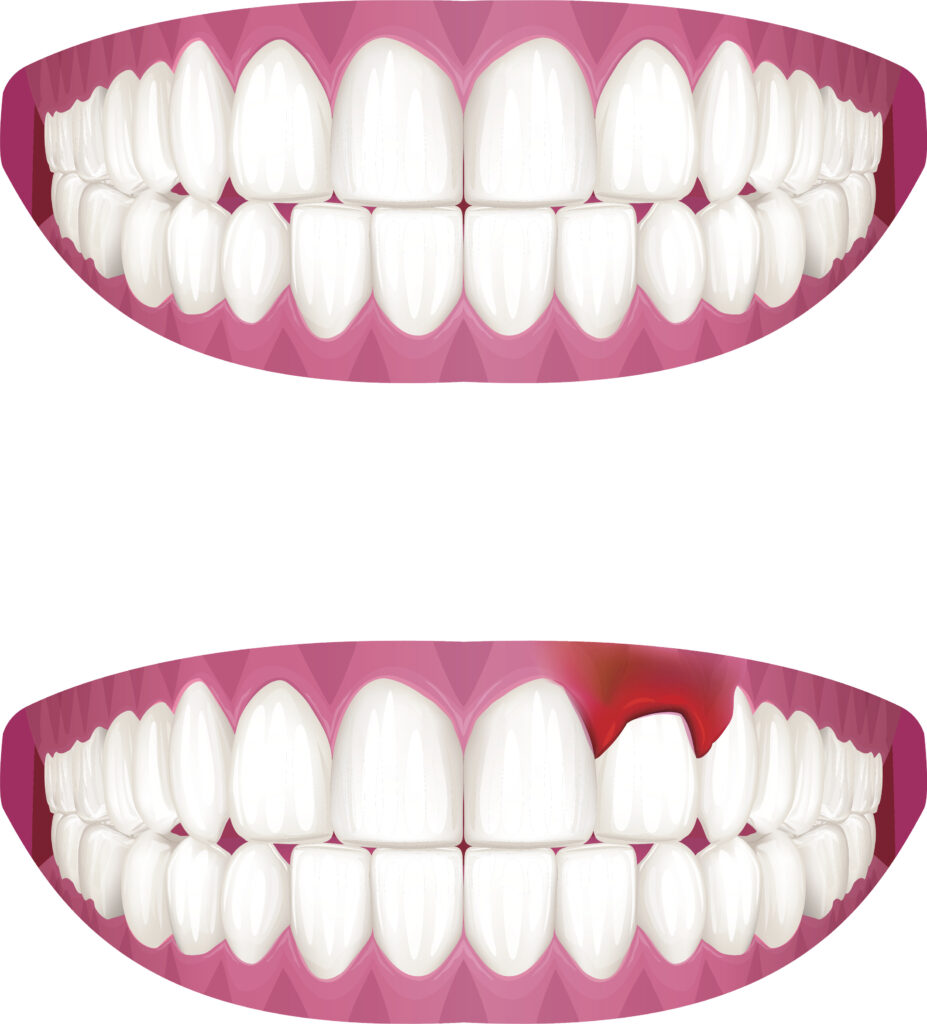Swollen gums are one of the telltale signs of gingivitis or gum disease. But this could also mean other things. It can be because of food trapped in between the teeth that is irritating the gums or maybe systemic conditions such as vitamin deficiencies, a disease, or hormonal imbalance. It can also be a temporary or permanent condition depending on the cause.
But no matter the reason for swollen gums around the tooth, it is best that your dentist can take a closer look so they can provide the most suitable treatment. The earlier the diagnosis and treatment, the better and healthier your smile and oral health are.
What do swollen gums look like?
Normal gums are intact and are pinkish. However, swollen gums are of a slightly reddish or purplish hue. This is due to increased blood flow in the area because of possible irritation or infection. Apart from being abnormally puffy, enlarged, or protruding, they may also appear smooth and shiny.
Swollen gums are also more prone to bleeding, even with the slightest trigger. Patients with swollen gums around their teeth would find that their gums easily bleed whenever they brush and floss.
It is important to treat swollen gums because they cause gum pain. They also have a serious impact on your gum health, which, in the worst case, can even lead to tooth loss.

What causes swollen gums?
Swollen gums are a fairly common occurrence and they can be caused by several possible reasons. It may occur in just one tooth or it can also involve most of your gum tissues.
Some of the most usual dental causes are:
1. Gingivitis
The most common symptom of gingivitis or gum disease is swollen gums. This is most often due to poor oral hygiene and plaque build-up. Over time, plaque and tartar will irritate the gums and eventually will lead to gingivitis.
This can be easily resolved with teeth cleaning and a proper oral hygiene routine.
2. Periodontitis
Advanced gum disease is called periodontal disease and this occurs if gingivitis is left untreated for a long time.
At this stage, the bone surrounding the teeth becomes infected to cause loose teeth. The gums including all the tissue around may also be severely affected to look more inflamed and red.
3. Food debris
Food particles in between the teeth may cause swelling of gums around one tooth. This is usually an isolated case and is because of temporary irritation.
Once the debris is removed through brushing and flossing, your gums should return to normal.
4. Infected tooth
Deep cavity or tooth trauma are likely reasons for an infected tooth. One of the symptoms will include swollen gums or a pimple on the gum area where the infection is.
Aside from this, severe pain and pus formation may also be present. Treatment should be done as soon as possible to prevent the spread of bacteria.
5. Ill-fitting dentures
Dentures that are too tight on the gums may also cause swelling especially if you have new dentures and your gums are just getting used to them. Eventually, your dentures should fit better. But if it persists, visit your dentist so they can make the necessary adjustments.
6. Faulty restorations
Dental fillings may also indirectly cause swollen gums. Overhangs or extended filling material and unpolished restorations may cause food impaction and plaque accumulation. This can get the gums irritated and inflamed and can only be fixed by repairing your dental fillings.
7. Orthodontic treatment
Dental braces are also a usual culprit of swollen gums. Because they are foreign material, the gums may sometimes get irritated due to the metal brackets and wires.
Also, they harbor plaque and bacteria easily which can cause gum issues.
But aside from dental-related concerns, gum swelling may also be a significant factor in the diagnosis of systemic conditions and as a side effect of treatment. Such include:
- Unmanaged diabetes
- Vitamin deficiencies (Vit. B or C)
- Side effects from medications, as in immunosuppressants or for blood pressure control and seizures
- Chronic smoking
- Blood cancers, such as leukemia
- HIV or oral herpes
- Fungal infections
What can you do about swollen gums?
The best treatment for swollen gums is to determine the cause and take it from there. With proper assessment and the right diagnosis, your dentist can provide the most effective treatment plan.
Generally, swollen gums caused by gum or periodontal disease can be treated with oral prophylaxis or teeth cleaning and an improved hygiene routine. Once bacteria, plaque, and tartar are removed, your gums should go back to normal.
However, systemic conditions causing inflamed gums, such as viral and fungal infections, must be coordinated with your physician. These are signs and symptoms of a larger concern and must be addressed as soon as possible to prevent further complications.
General advice: brush your teeth twice a day and pay attention to reduced plaque. This are simple tips, which can be reached with home remedies.
Gum Care at Cosmedica Dental
At Cosmedica Dental, our dental clinic in Turkey, we take gum care seriously by providing our patients with preventive measures and dental treatments to reinforce their oral health. This includes a dental spa treatment that involves a comprehensive oral check-up, teeth cleaning and scaling, and even teeth whitening. This is recommended every 6 months to improve and maintain your healthiest smile.
Book an appointment today to learn more about our complete general and cosmetic dentistry services as well as medical treatments!